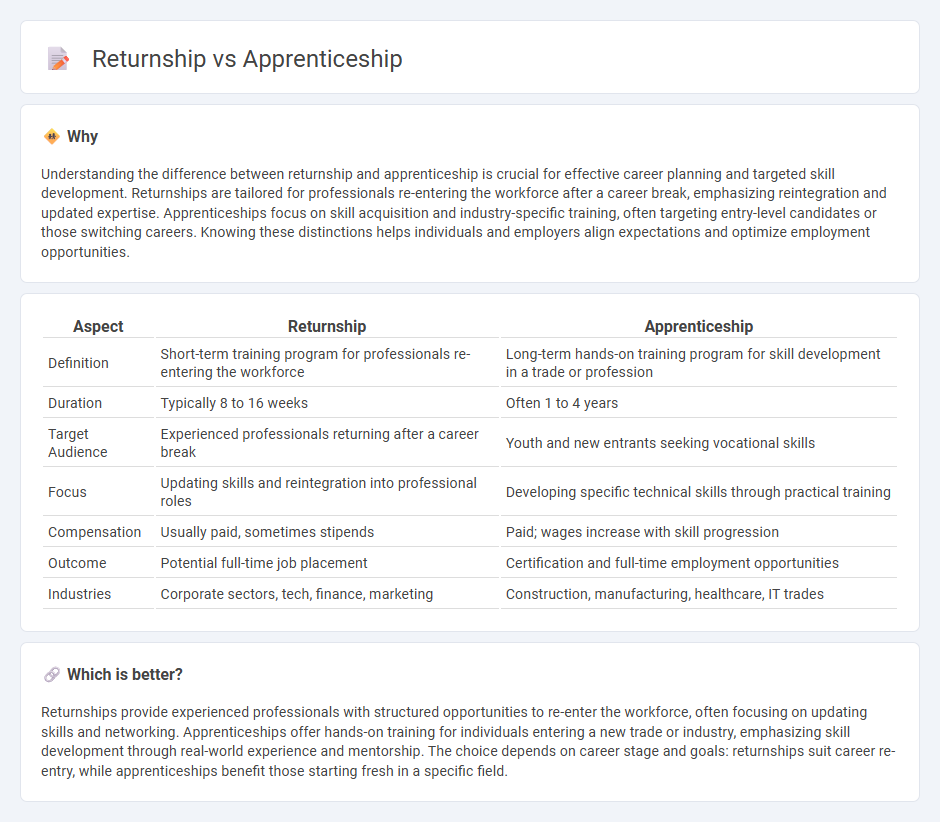
Returnships offer experienced professionals a structured pathway to re-enter the workforce after a career break, focusing on skill refreshment and industry reintegration. Apprenticeships provide hands-on training and skill development for individuals new to a trade or profession, combining practical work with classroom learning. Explore more to understand which pathway aligns best with your career goals and current experience.
Why it is important
Understanding the difference between returnship and apprenticeship is crucial for effective career planning and targeted skill development. Returnships are tailored for professionals re-entering the workforce after a career break, emphasizing reintegration and updated expertise. Apprenticeships focus on skill acquisition and industry-specific training, often targeting entry-level candidates or those switching careers. Knowing these distinctions helps individuals and employers align expectations and optimize employment opportunities.
Comparison Table
| Aspect | Returnship | Apprenticeship |
|---|---|---|
| Definition | Short-term training program for professionals re-entering the workforce | Long-term hands-on training program for skill development in a trade or profession |
| Duration | Typically 8 to 16 weeks | Often 1 to 4 years |
| Target Audience | Experienced professionals returning after a career break | Youth and new entrants seeking vocational skills |
| Focus | Updating skills and reintegration into professional roles | Developing specific technical skills through practical training |
| Compensation | Usually paid, sometimes stipends | Paid; wages increase with skill progression |
| Outcome | Potential full-time job placement | Certification and full-time employment opportunities |
| Industries | Corporate sectors, tech, finance, marketing | Construction, manufacturing, healthcare, IT trades |
Which is better?
Returnships provide experienced professionals with structured opportunities to re-enter the workforce, often focusing on updating skills and networking. Apprenticeships offer hands-on training for individuals entering a new trade or industry, emphasizing skill development through real-world experience and mentorship. The choice depends on career stage and goals: returnships suit career re-entry, while apprenticeships benefit those starting fresh in a specific field.
Connection
Returnship and apprenticeship programs both serve as structured pathways to employment, targeting different demographic groups but sharing a focus on skill development and workforce reintegration. Returnships cater primarily to professionals re-entering the workforce after career breaks, offering hands-on experience and mentorship, while apprenticeships provide paid, on-the-job training for individuals entering a trade or industry. Both approaches enhance employability by combining practical experience with formal learning, increasing the likelihood of sustainable employment outcomes.
Key Terms
Training
Apprenticeships provide structured, hands-on training programs designed to develop specific skills through practical work experience, often targeting entry-level individuals. Returnships focus on re-skilling or up-skilling professionals re-entering the workforce after a career break, combining training with mentorship to ease the transition. Explore how these distinct training approaches can enhance career development in varied professional contexts.
Career Transition
Apprenticeships provide hands-on training for individuals entering a new career, often targeting students or entry-level workers, while returnships are designed for professionals re-entering the workforce after a career break, emphasizing skill refreshment and workplace reintegration. Both programs facilitate career transitions by offering structured learning and real-world experience, but returnships specifically address gaps in employment history and evolving industry trends. Explore these pathways to identify the best fit for your career transition needs.
Work Experience
Apprenticeships offer structured training programs combining on-the-job experience with classroom instruction, primarily targeting entry-level candidates seeking industry-specific skills. Returnships are designed for professionals reentering the workforce after a career break, providing tailored work experience and mentorship to update skills and rebuild confidence. Explore these pathways to find the best fit for gaining relevant work experience and advancing your career.
Source and External Links
Apprenticeship | RI Department of Labor & Training - RI.gov - Apprenticeship combines paid on-the-job learning with related instruction to increase skill levels and wages, offering an employer-driven, "earn and learn" model that provides immediate employment with advancement and nationally recognized credentials.
Apprenticeship Utah - Apprenticeship is an "earn and learn" training model combining on-the-job learning with classroom instruction, providing benefits such as wage increases, job security, and a portable, recognized credential or degree.
Apprenticeship.gov: Homepage - Apprenticeship.gov is a central resource connecting job seekers, employers, and educators with apprenticeship opportunities across industries, highlighting strong results including high employment retention and lifetime earnings advantages for apprentices.
 dowidth.com
dowidth.com